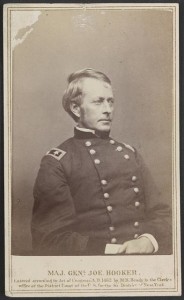From the Richmond Daily Dispatch May 8, 1863:
The Situation on the Rappahannock
The information received from the Rappahannock to the present time is not detailed, and with respect to the present condition of the opposing forces not very definite. It is understood that the enemy being driven from Chancellorsville, fell back in the direction of the United States ford, where he collected his forces and commenced fortifying. Our own army has command of the fords above and below him. Thus matters stand; but it may be inferred will not remain thus long.
Soldiers engaged in the fight at Fredericksburg with Sedgwick’s corps, report that after he crossed on Monday night several very bright fires were seen on the Falmouth shore. They were of such magnitude as to justify the supposition that immense buildings or stores were consumed. Our men were at a loss to conjecture what was the cause; but some inferred that the enemy was alarmed, under the apprehension of an advance of our forces, and were burning stores. The same evening immense lines of wagons were seen winding along, up the river. These were no doubt conveying provisions for Hooker’s army in its new camps.
The enemy cannot feel very comfortable in his present position, to which he has been driven. Like some hunted beast he can but feel that he enjoys a temporary respite from his pursuers. Oh! for a gunboat! he no doubt ejaculates. A gunboat to a Yankee in such a strait is the blessedest thing on earth! To McClellan, at Wilcox’s wharf, the mailed vessels were like guardian angels. They gave rest and sound sleep to the wounded and wearied Yankees, such as they had not known for many nights.
Though our victory is important, and the results of great magnitude, it might possibly receive some additions. Everybody, however, feels entire confidence in our army and its able commander, and are convinced that whatever can be done will be done, and that in good time.
Meanwhile, 150 years ago yesterday President Lincoln telegraphed General Hooker. The president succinctly faced the fact of defeat, encouraged more aggressive action, expressed confidence in his general’s judgment, but offered to help come with a new plan of action, if requested.
From The Papers And Writings Of Abraham Lincoln, Volume Six:
TO GENERAL J. HOOKER.
HEADQUARTERS ARMY OF THE POTOMAC, May 7, 1863.
MAJOR-GENERAL HOOKER.
MY DEAR SIR:—The recent movement of your army is ended without effecting its object, except, perhaps, some important breakings of the enemy’s communications. What next? If possible, I would be very glad of another movement early enough to give us some benefit from the fact of the enemy’s communication being broken; but neither for this reason nor any other do I wish anything done in desperation or rashness. An early movement would also help to supersede the bad moral effect of there certain, which is said to be considerably injurious. Have you already in your mind a plan wholly or partially formed? If you have, prosecute it without interference from me. If you have not, please inform me, so that I, incompetent as I may be, can try and assist in the formation of some plan for the army.
Yours as ever,
A. LINCOLN.

![Map shewing [sic] movements of Union and Rebel armies and Battle of Chancellorsville, Virginia from April 27th to 4th May 1863. Sneden, Robert Knox, 1832-1918. (LOC: gvhs01 vhs00300 http://hdl.loc.gov/loc.ndlpcoop/gvhs01.vhs00300)](https://www.bluegrayreview.com/wp-content/uploads/2013/05/Chancellorsville-198x300.jpg)
